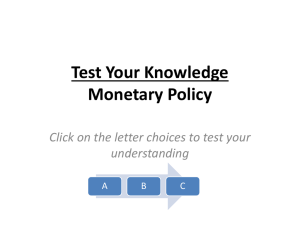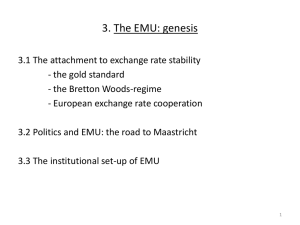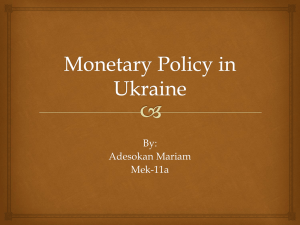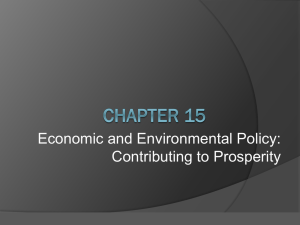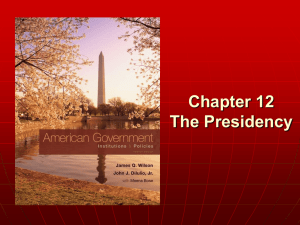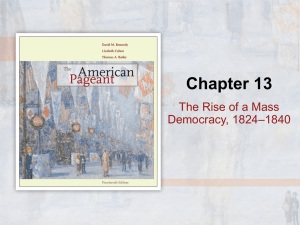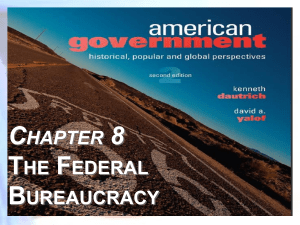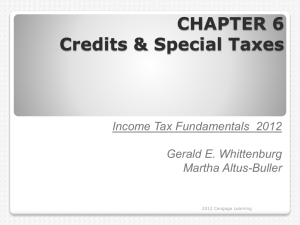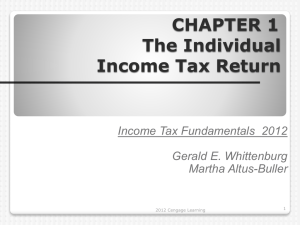L12_20110513
advertisement
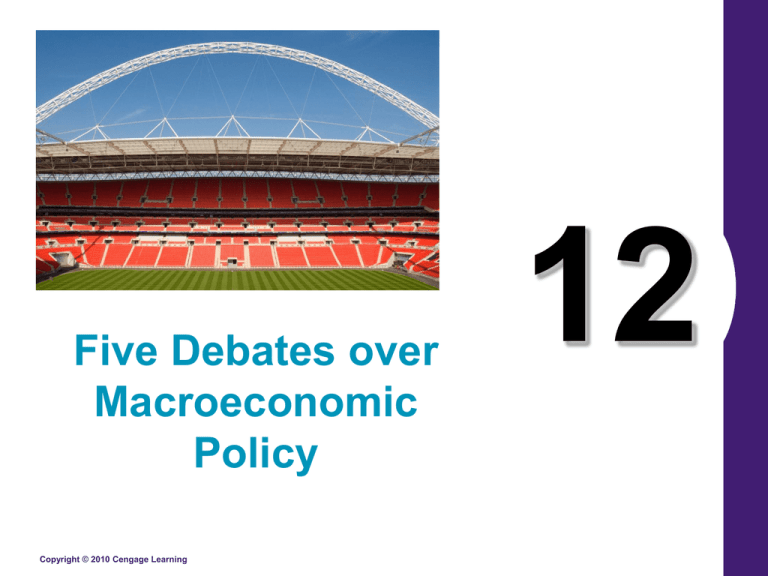
Five Debates over Macroeconomic Policy Copyright © 2010 Cengage Learning 12 The Continuing Economic Debate Even though economists in general agree on the main macroeconomic theoretical concepts they largely differ on how the theory should be applied for solving the immediate issues with which the governments must deal. Today’s lecture aims to provide the arguments of both sides in five leading debates over the economic policy: 1. whether policy makers should try to stabilize the economy? 2. whether monetary policy should be made by rule rather than by discretion? 3. whether the government should balance its budget? 4. whether the tax laws should be reformed to encourage saving? 5. whether the UK should join the European monetary union? Copyright © 2010 Cengage Learning Should Monetary and Fiscal Policy Makers Try to Stabilize the Economy? • Advocates of active monetary and fiscal policy view the economy as inherently unstable and believe that policy can manage aggregate demand in order to offset the inherent instability. • Critics of active monetary and fiscal policy emphasize that policy affects the economy with a lag and that our ability to forecast future economic conditions is poor. As a result, attempts to stabilize the economy can end up being destabilizing. Copyright © 2010 Cengage Learning Pro: Policy Makers Should Try to Stabilize the Economy 1. When households and firms feel pessimistic, aggregate demand falls. This causes output to fall and unemployment to rise. 2. There is no reason for the economy to suffer through a recession when policy makers can reduce the severity of economic fluctuations. 3. Thus, policy makers should take an active role in leading the economy to stability. 4. When aggregate demand is inadequate to ensure full employment, policy makers should act to boost spending in the economy. When aggregate demand is excessive and there is a risk of inflation, policymakers should act to lower spending. 5. Such policy actions put macroeconomic theory to its best use by leading to a more stable economy. Copyright © 2010 Cengage Learning Con: Policy Makers Should Not Try to Stabilize the Economy 1.There are substantial difficulties associated with running fiscal and monetary policy. One of the most important problems to remember is the time lag that often occurs with policy. 2. Economic conditions change over time. Thus, policy effects that occur with a lag may hit the economy at the wrong time, leading to a more unstable economy. 3. Therefore, policy makers should refrain from intervening and be content with “doing no harm.” Copyright © 2010 Cengage Learning Should Monetary Policy Be Made by Rule Rather than by Discretion? • Advocates of rules for monetary policy argue that discretionary policy can suffer from incompetence, abuse of power, and time inconsistency. • Critics of rules for monetary policy argue that discretionary policy is more flexible in responding to changing economic circumstances. Copyright © 2010 Cengage Learning Pro: Monetary Policy Should Be Made by Rule 1. Discretion in the conduct of monetary policy has at least three problems: • • • It does not limit incompetence and abuse of power. There may be problems if monetary policy committee members disagree about the future rate of inflation and so disagree about interest rate changes. There is also the problem that the people responsible for making decisions about interest rates, that affect millions of people, are unelected and not democratically accountable. 2. One way to avoid these problems is to force the central bank to follow a monetary rule. This rule could be flexible enough to allow for some information on the state of the economy. Copyright © 2010 Cengage Learning Con: Monetary Policy Should Not Be Made By Rule 1. Discretionary monetary policy allows flexibility. This gives the central bank the ability to react to unforeseen situations quickly. 2. It is also unclear that central bankers use policy to help political parties. 3. Nor is it clear that the time-inconsistency of monetary policy makers is a major problem. 4. It would also be very difficult to specify a precise rule. Copyright © 2010 Cengage Learning Should the Government Balance Its Budget? • Advocates of a balanced government budget argue that budget deficits impose a burden on future generations by raising their taxes and lowering their incomes. • Critics of a balanced government budget argue that the deficit is only one small piece of fiscal policy. Singleminded concern about the budget deficit can obscure the many ways in which policy, including various spending programes, affect different generations. It also ignores the important role of automatic fiscal stabilizers in ironing out fluctuations over the economic cycle. Copyright © 2010 Cengage Learning Pro: The Government Should Balance Its Budget 1. Future generations of taxpayers will be burdened by the government’s debt. This will lower the standard of living for these future generations. 2. Budget deficits cause crowding out. Reduced national saving raises interest rates and lowers investment. A lower capital stock reduces productivity and thus leads to a smaller amount of economic growth than would have occurred in the absence of this budget deficit. 3. It is sometimes justifiable to run budget deficits, such as in times of war or recession. However, if the government runs a deficit during a recession it should run a budget surplus when the economy recovers. Over the course of the business cycle, the government budget should be balanced. Copyright © 2010 Cengage Learning Con: Government Should Not Balance Its Budget 1. The problems caused by the government debt are overstated. The future generation’s burden of debt is relatively small when compared with their lifetime incomes. 2. It is important that any change in government spending is examined for external effects. • If education spending is cut, for example, this may well lead to lower economic growth in the future. 3. Governments should distinguish between borrowing to finance investment and borrowing to finance current expenditure. Copyright © 2010 Cengage Learning Should the Tax Laws Be Reformed to Encourage Saving? • Advocates of tax incentives for saving point out that society discourages saving in many ways, such as by heavily taxing the income from capital and by reducing benefits for those who have accumulated wealth. They endorse reforming the tax laws to encourage saving. • Critics of tax incentives for saving argue that many proposed changes to stimulate saving would primarily benefit the wealthy, who do not need a tax break. They also argue that such changes might have only a small effect on private saving. Raising public saving by increasing the government’s budget surplus would provide a more direct and equitable way to increase national saving. Copyright © 2010 Cengage Learning Pro: Tax Laws Should Be Reformed to Encourage Saving 1. The greater the amount of saving in an economy, the more funds there are available for investment. This increases productivity, raising the nation’s standard of living. 2. Because people respond to incentives, changing the tax laws to make saving more attractive will raise the amount of funds saved. Current laws tax the return on saving fairly heavily. 3. Tax laws are not the only government policy that discourage saving. Some government benefits, such as long-term care and pensions are often means-tested. 4. There are various ways to change the tax laws to encourage saving. Copyright © 2010 Cengage Learning Con: The Tax Laws Should Not Be Reformed to Encourage Saving 1. Increasing saving is not the only goal of tax policy. Policy makers are interested in using tax policy to redistribute income, making sure that the burden of taxation falls on those who can most afford it. 2. Saving can be increased in other ways. For example, governments could lower budget deficits (or increase budget surpluses) to raise public saving. 3. Lowering the tax on capital income lowers the revenue of the government. This may increase the budget deficit, lower public saving, and push national saving down as well. Copyright © 2010 Cengage Learning Should the UK Join European Monetary Union? • Advocates of UK membership of EMU membership emphasize the reduction in transaction costs in international trade that would follow from adopting the euro. The loss of exchange rate adjustment would be countered by ending the exchange rate volatility and swings in competitiveness that UK industry has suffered for the last 30 years. • Sceptics point out that a ‘one-size-fits-all’ monetary policy may not suit the UK economy and could lead to substantial short-term fluctuations in output and unemployment, while the present UK monetary policy framework appears to be working well. Copyright © 2010 Cengage Learning Pro: The UK Should Join EMU 1. There would be reduced transaction costs in trade between the UK and other EMU countries. 2. The monetary policy regime in the EMU is not dissimilar to that in the UK. 3. EMU is the final step in the creation of the Single European Market and the USA provides and example of the advantage of a huge domestic market in which all transactions are made in the same currency. 4. Joining EMU would lead to closer financial market integration leading to increased competition and efficiency gains in financial services. 5. Joining EMU would enhance the attractiveness of the UK as a destination for foreign direct investment. Copyright © 2010 Cengage Learning Con: The UK Should Not Join EMU • The UK’s trade with EMU countries constitutes a smaller fraction of GDP than is the case of many EMU countries. • The UK would be giving up control over its own monetary policy and the ability to use the exchange rate as a means of macroeconomic adjustment. • The UK would be subject to constraints on its fiscal policy too. • The argument that greater financial integration could cushion the UK from shocks that might cause recessions might be exaggerated. Copyright © 2010 Cengage Learning Conclusion • The study of economics does not always make it easy to choose among alternative policies. • By clarifying the inevitable trade-offs that policy makers face, it can make the choice more difficult. • Few if any policies come with benefits but not cost. • If you hear politicians or commentators offering you a free lunch you should look for the hidden price tag. Copyright © 2010 Cengage Learning
